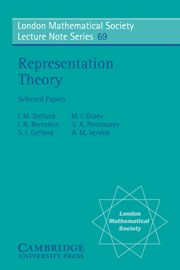Book contents
- Frontmatter
- Contents
- Two papers on representation theory
- Representations of the group SL(2,R), where R is a ring of functions (RMS 28:5 (1973) 87–132)
- Representations of the group of diffeomorphisms (RMS 30:6 (1975) 1–50)
- An introduction to the paper “Schubert cells and cohomology of the spaces G/P”
- Schubert cells and cohomology of the spaces G/P (RMS 28:3 (1973) 1–26)
- Four papers on problems in linear algebra
- Coxeter functions and Gabriel's theorem (RMS 28:2 (1973) 17–32)
- Free modular lattices and their representations (RMS 29:6 (1974) 1–56)
- Lattices, representations and algebras connected with them I (RMS 31:5 (1976) 67–85)
- Lattices, representations and algebras connected with them II (RMS 32:1 (1977) 91–114)
Representations of the group SL(2,R), where R is a ring of functions (RMS 28:5 (1973) 87–132)
Published online by Cambridge University Press: 06 July 2010
- Frontmatter
- Contents
- Two papers on representation theory
- Representations of the group SL(2,R), where R is a ring of functions (RMS 28:5 (1973) 87–132)
- Representations of the group of diffeomorphisms (RMS 30:6 (1975) 1–50)
- An introduction to the paper “Schubert cells and cohomology of the spaces G/P”
- Schubert cells and cohomology of the spaces G/P (RMS 28:3 (1973) 1–26)
- Four papers on problems in linear algebra
- Coxeter functions and Gabriel's theorem (RMS 28:2 (1973) 17–32)
- Free modular lattices and their representations (RMS 29:6 (1974) 1–56)
- Lattices, representations and algebras connected with them I (RMS 31:5 (1976) 67–85)
- Lattices, representations and algebras connected with them II (RMS 32:1 (1977) 91–114)
Summary
We obtain a construction of the irreducible unitary representations of the group of continuous transformations X → G, where X is a compact space with a measure m and G = PSL(2, R), that commute with transformations in X preserving m.
This construction is the starting point for a non-commutative theory of generalized functions (distributions). On the other hand, this approach makes it possible to treat the representations of the group of currents investigated by Streater, Araki, Parthasarathy, and Schmidt from a single point of view.
Introduction
One stimulus to the present work was the desire to extend the theory of generalized functions to the non-commutative case. Let us explain what we have in mind.
Let R be the real line, X a compact manifold, and f(x) an infinitely differentiable function on X with values in R, that is, a mapping X → R. A group structure arises naturally on the set of functions f(x), which we denote by RX. Irreducible unitary representations of this group are defined by the formula f(x) → eil(f) where l is a linear functional in the space of “test” functions f(x). Thus, to each generalized function (distribution) there corresponds an irreducible representation of Rx. If we replace R by any other Lie group G, then it is natural to ask for the construction of irreducible unitary representations of the group Gx, regarded as a natural non-commutative analogue to the theory of distributions. Such an attempt was made in [1], § 3.
- Type
- Chapter
- Information
- Representation TheorySelected Papers, pp. 15 - 60Publisher: Cambridge University PressPrint publication year: 1982
- 1
- Cited by



